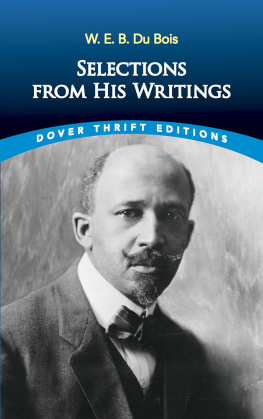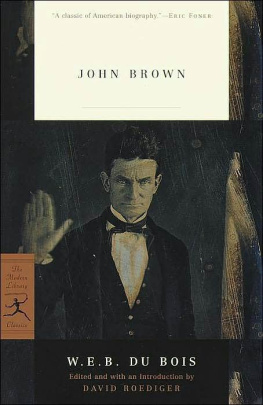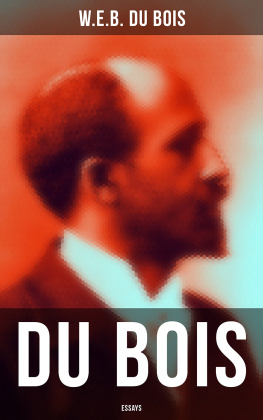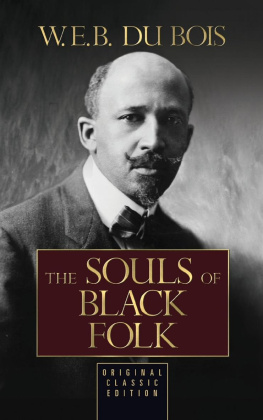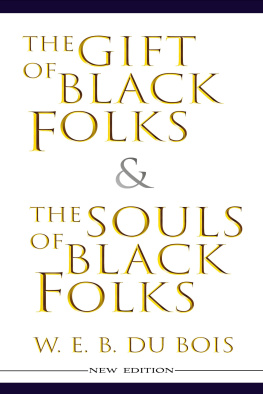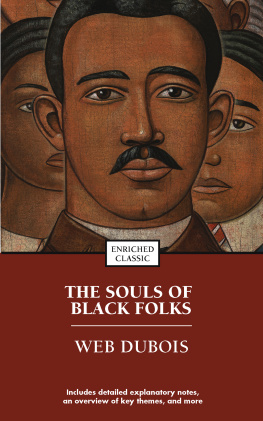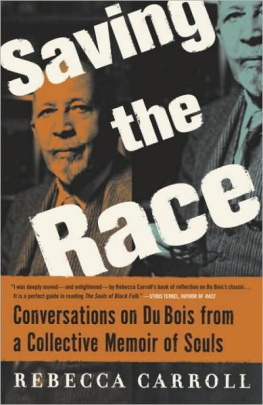
W. E. B. Du Bois
S ELECTIONS FROM H IS W RITINGS
Edited by Bob Blaisdell

DOVER PUBLICATIONS, INC.
Mineola, New York
DOVER THRIFT EDITIONS
G ENERAL E DITOR : M ARY C AROLYN W ALDREP
E DITOR OF T HIS V OLUME : B OB B LAISDELL
Copyright
Copyright 2014 by Dover Publications, Inc.
All rights reserved.
Bibliographical Note
W. E. B. Du Bois: Selections from His Writings, first published by Dover Publications, Inc., in 2014, is a new anthology of essays reprinted from standard sources. A new introductory Note has been specially prepared for this edition.
International Standard Book Number
eISBN-13: 978-0-486-31593-5
Manufactured in the United States by Courier Corporation
49623601 2014
www.doverpublications.com
Contents
NOTE
He began to know and learn of things which other people did not know. Not that they knew nothing about them, but they had not brought together all the facts. One isolated person knew that fact and one knew this fact, but no one person knew both facts in juxtaposition. When they did become acquainted with all the facts he was sure that they must be moved to act. What then must he do? He must agitate.
W. E. B. Du Bois, The Value of Agitation
W ILLIAM E DWARD B URGHARDT D U B OIS , born in 1868, just three years after the end of Americas terrible and unfortunately necessary Civil War, lived into and influenced Americas other most socially convulsive decade, the 1960s. He was a modern writer and thinker, a first-rate sociologist, an expert cultural historian, and one of Black Americas most important political advocates. From his first five decades, I have selected some of the essays, articles, editorials and short creative pieces that stand on their own and also demonstrate the range of Du Boiss understanding of race in America. I have introduced each selection with thematic or bibliographic information and provided footnotes for names and references that Du Bois would have expected his original audiences to know, but that we, a hundred years later, may have forgotten or never have encountered.
Du Bois is still important because the issues that pulled him into the whirlwind of the fight for racial and gender equality in America are not yet resolved or won, and he can show us, through his clear-eyed, passionate voice, how and why to continue the call for universal justice.
* * *
Du Bois described himself as born with a flood of Negro blood, a strain of French, a bit of Dutch, and thank God! no Anglo-Saxon... Raised in Great Barrington, a pleasant, relatively tolerant town in southwestern Massachusetts, he was an outstanding student, a favorite among fellow children, and as an adolescent was already publishing articles in local newspapers. Blissfully innocent, Du Bois was slow to perceive the obstacles he, as an American of black heritage, would face. When he remembered the limitless possibilities he imagined available to him, the recollections touched him to the quick:
Very gradually I began to feel myself apart from my play fellows, with a special work, a special race. The realization came slowlyalthough at times there were sudden revelations. Curious enough, however, I always felt myself the superior, not the inferior, and any advantages which they had were, I was sure, quite accidental. I had only to mobilize my dreamsthen they would see!
I was graduated from the high school at sixteen. It was my first open triumph. I talked on Wendell Phillips, and all my town applauded with my mother. It was her great day, and after it she soon turned her face to the wall and slept. I was long in realizing my loss. That came many years after. Now it was the feel of wings. I was going beyond the hills, into the world which beckoned steadily.
There came a little pause. I wanted to go to Harvard, but white friends said I should go South, and they promised a scholarship. Very well, I was eager to see my people. They were yet strangers to me. So I embraced the opportunity, quite forgetting the curious irony by which I was not regarded as a real citizen of my birth town, with a future and a career, and went to a far land, among strangers who were regarded as (and in truth were) mine own people.
His own people were at Fisk University, a black college in Nashville, Tennessee. As he discovered the South, he discovered a hazily familiar culture that revealed to him American history and a social order that denied him equal rights and opportunities. While at Fisk, he taught black children in the summer in small-town Tennessee schools. He completed his degree in three years, and indeed found his way back to Harvard in 1888. His naivete even served him well; he saw no reason why he shouldnt or couldnt receive awards and scholarships and soon found himself with a fellowship to study in Berlin, Germany. He tells us he was happy and content with his situation and social status for perhaps the last time in his life: I dreamed and loved and wandered and sang; then, after two long years, I dropped suddenly back into nigger-hating America!
Though he always claimed he would have preferred the quiet, inconspicuous life of a scholar, Du Bois had barely left Harvard when he began to believe that the Negro is a sort of seventh son, born with a veil, and gifted with second-sight in this American world.... It is a peculiar sensation, this double-consciousness, this sense of always looking at ones self through the eyes of others, of measuring ones soul by the tape of a world that looks on in amused contempt and pity. One ever feels his two-ness,an American, a Negro; two souls, two thoughts, two unreconciled strivings; two warring ideals in one dark body, whose dogged strength alone keeps it from being torn asunder.
The leading public figure of Black America at the time, however, was the famed Booker T. Washington (18561915), who for decades had been the principal of the Tuskegee Normal and Industrial Institute in Alabama. While Washington had been an important liaison between the U.S. Government and the black citizens of the South, he was now disparaged by many as the Great Accommodator; Du Bois and other black Northern intellectuals and professionals felt trapped by Washingtons concessions to the local, state, and federal governments. Washington, who believed in trade-school training as a remedy to blacks economic dependence, was willing to accept second-class status, voting and civil rights restrictions, and racial segregation in exchange for funding; trade-schooling may have had its use in the reactionary post-war South, Du Bois might concede, but it was otherwise outrageous as far as civil justice was concerned. Du Bois tried to see his way to collaborating with Washington but quickly became leery of the political maneuvering in Tuskegee and decided with other black professionals to create an organization that would maintain a firm advocacy for equal rights, not only for black men but for women.
Du Bois organized the Niagara Movement in 1905, which evolved into the National Association for the Advancement of Colored People in 1910, of which he was a founder. One of Du Boiss biographers observes: the shift from science to propagandahowever disjunctive professionallywas also supremely suited to Du Boiss temperament and talent. The NAACP, based in New York City, was a ship with many captains; as the editor of The Crisis, the NAACPs magazine, Du Boiss bold opinions brought national attention to the politics of race, often more emphatically than desired by the multiracial board.
Next page
